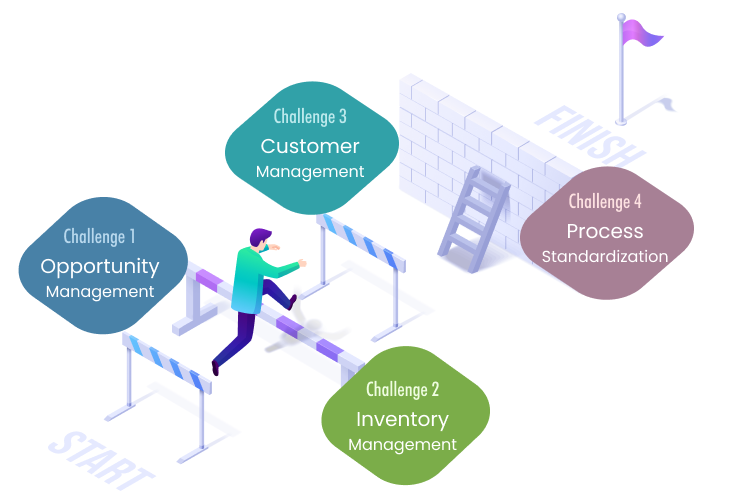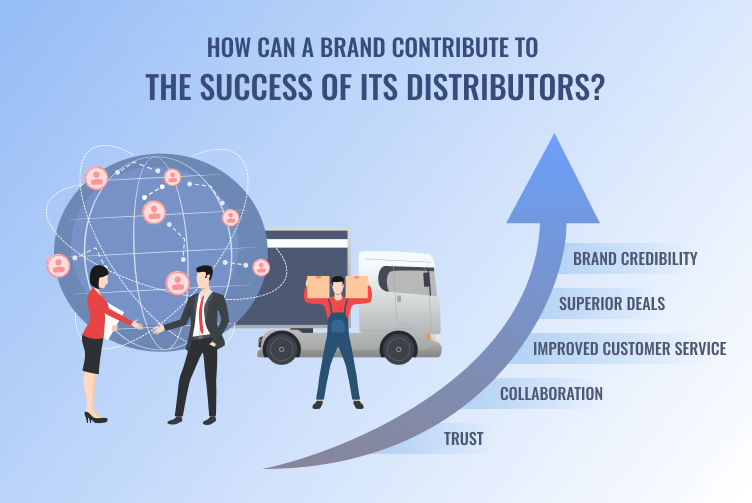It is simplistic to assume that distributor management in the B2B world is merely about picking, packing, and shipping goods. The B2B distributor management space is inherently more complex owing to product and service complexities, an increasingly competitive market, and constrained opportunities to improve profitability.
These challenges were further exacerbated by the onset of the pandemic. Unpredictable demand, supply chain disruptions, concerns for workforce safety, and business continuity have pushed the needle in favour of digital services.
Here are some of the unique challenges of distributor management in the B2B world:
Wide and complex product and service range
B2B products and service portfolios can be huge. Multiple combinations run through business processes as there are many customers to service and multiple distribution channels to manage. The company also needs to manage complexities created by a combination of scale and fragmentation, like the need to ensure location-specific pricing. Distributors have their own peculiarities that cause complexity. For instance, many log in product information in different formats. Managing SKUs and ensuring complete and up-to-date product information often becomes extremely challenging owing to these inconsistencies.
B2B distributor management must ensure that the product sales data are always updated, that any trends or changes in the market are duly noted and registered to avoid misinformation and that product and sales data are uniform and cohesive across the distributor network.
Inventory management
Inventory management challenges are not new in the distributor network. However, it is clear that robust inventory management capabilities have a direct impact on the bottom line and improving these capabilities can significantly impact business outcomes.
Given the complexity of products and services in the B2B domain, inventory management becomes a tough beast to tame. The bigger the distributor network, the greater the challenge of collating information from across the channel about product movements and requirements. Fragmented and manual inventory management becomes error-prone and time-consuming. It also impedes agility and impacts the ability to service market needs and anticipate market demands at scale.
The right digital solutions that account for the product and service needs of the B2B space, make it easy for the distributor to add information, enable automation of the right processes, and provide deep and clear insights into inventory status in the most granular detail are essential to thrive in today’s dynamic market.
Customer management
Customer management is another challenge for those operating in the B2B space. Consumers are getting increasingly demanding. Many want greater online interactions. The B2B buyer demographic has also changed as millennials now become the primary demographic leading these conversations. Now B2B has to mimic B2C interactions and provide elevated, intuitive, personalized, and contextual customer interactions.
Providing the right value-added services, identifying personalization opportunities, and evaluating ways to stay top of the mind of the customer become essential traits for distributors to develop. And the brand must be able to share marketing material, product information, sales promotions, and campaigns to distributors in a timely fashion to enable just that.
Increasing the capacity to harness data and leverage it to drive customer relationships and identifying avenues to improve customer experiences become imperative in a digital world to improve distributor management capabilities.
Opportunity management
With complex products and services to work with and an extremely competitive landscape to operate in, opportunity management is a critical area that has a big impact on the bottom line. However, owing to these complexities and given the stakes, opportunity management in this field is anything but simple.
Insights into the sales channels, sales data, stock movement, schemes, etc. are all critical for identifying opportunities and ensuring revenue opportunities do not slip through the cracks. It is also important to get complete and detailed information on customized products in real-time.
Brands also must ensure that they have all the information regarding the varying demand for all product variations since there can be instances where one product might have multiple variations and each variation might not be significantly different from the other.
Having the right digital solution that provides detailed, comprehensive, and real-time data insights becomes crucial capabilities to develop to improve opportunity management capabilities. With the right and timely data insights, it becomes inherently simpler for the brand and distributors to manage existing customers, identify and manage existing prospects with data-backed confidence and fine-tune future opportunities.
Challenges in process standardization
Managing multiple product lines and SKUs is another challenge in B2B distributor management. Owing to extreme competition, customizations become quite commonplace in the B2B world. Customer and distributor-specific pricing are also quite prevalent in this landscape. Along with these aspects, there is the management of schemes and promotions that need careful handling to ensure that the benefits reach the end customer and ultimately drive profitability.
The distributor network, however, does not operate within standardized processes and does not leverage the data at hand adroitly. Managing the data taxonomies and collecting and capably analyzing data such as product and customer data to location data, asset data, and creating a single source of truth become critical capabilities to develop to improve distributor management.
Establishing standardized processes and creating a single source of truth leveraging digital technologies is now essential to simplify distributor management in the B2B space. Employing robust and comprehensive digital solutions that use data and analytics to drive decision-making also become imperative for positive bottom lines. That apart, digital transformation of distribution management processes can also help in tracking compliance more robustly, improve distributor rewards and recognition management capabilities and drive customer delight while making the case for profitability and improved distributor relations. The rewards are great but the size of the challenge is great too!




